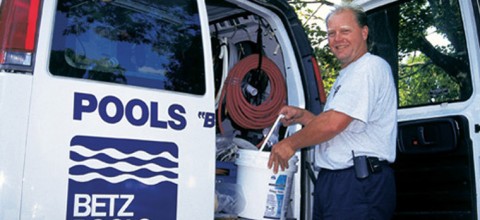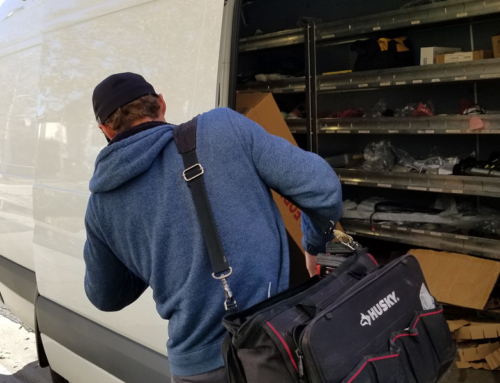If spa dealerships view your service department as a necessary evil rather than a profit center, you’re not alone, but you may be missing the boat—or the whole ship, for that matter.

Photo courtesy Betz Pools
Not so long ago, the recession curtailed consumer recreational spending. Yes, the hot tub industry has stabilized and made a bit of a recovery, but unfortunately, spas aren’t a replenishment product—even in times of plenty, once consumers have a spa, they’re unlikely to buy another one anytime soon. This trend could put hot tub retailers in a tough situation, needing to constantly explore any and every opportunity to eek out new sales. Customer acquisition is sometimes difficult, and often costly. However, spa retailers today may have an untapped gold mine—your own customer list. But how do you shape your business so you’re getting the most out of that existing customer base?
The answer may be found driving your service van.
Strength and Security
An Aqua Magazine 2016 State of the Industry Report conducted by APSP, along with market research firms Gallup and Pkdata, highlighted the rise of service in spa retail. Of all technicians surveyed, 75% reported that their service departments were either doing great, or doing well enough to get by. The signs suggest that the service aspect of traditional spa retail is thriving, even as the growth of new spa sales struggles for significant traction.
A strong focus on service provides ... a protective effect against the increasing influence of big-box retailers and online distributors.
Achieving growth in a saturated and increasingly competitive market means getting creative and identifying new opportunities for revenue. A strong focus on service provides an additional revenue source and, perhaps more importantly, a protective effect against the increasing influence of big-box retailers and online distributors who can afford to offer products barely above wholesale price and far below MSRP.
Growing Revenue with Service
Tim Fowler, General Manager of Brown’s Pools and Spas, and Jake Olweiler, President of Rocky Mountain Hot Tub Co in Breckenridge, Colorado are two dealers who have found that service infrastructure investments can help them achieve a strong ROI.
Service isn’t just about fixing a problem, it’s about strengthening long-term relationships with each customer.
Fowler believes service isn’t just about fixing a problem, it’s about strengthening long-term relationships with each customer. By aiming to help owners get the most out their overall hot tub experience instead of problem-fixing, technicians approach their work as an opportunity to develop post-sale relationships and identify additional sales. Olweiler adds, “Success of the business on the service end is about being able to be there all the time and whenever it’s needed.” Technicians trained to prioritize the customer experience build loyalty in each patron served, making it more likely that they’ll continue business with your store and refer their friends.
Cross-Selling
A cross-sale occurs when related or complementary items are promoted during a service transaction. It’s the “Would you like fries with that?” question.
Though 89% of retailers have a service department, only 58% of those service products not purchased in-house. Why the resistance? Service departments might seem like a profitability drain to dealers at first glance—a necessary evil of being a retailer that stands behind their products. However, this shortsighted mindset masks how quality service can pay off for hot tub dealers when operated the right way. That pay off includes additional sales and cross-selling is the way to start.

Jake Olweiler is quick to acknowledge that cross-selling potential with his clientele starts with a smart in-store sales approach. “The biggest fear for residential people having a hot tub is what they’ll have to do to maintain it. Just like a pool; they don’t want to mess with it.” So, sales of regular maintenance services are a bit of a no-brainer. New spa sales also become easier when the customer finds out some or all of that dreaded maintenance responsibility could be lifted from them.
Olweiler further explained his approach, “On the sales side, staff is trained to direct potential customers to service options. The sales guys are [trained] to try to sell monthly service contracts. They highlight how [customers] won’t have to worry about the maintenance.”
Service contracts generally include regular cleaning, sanitizer application, water tests, filter changes, and leak inspection, and can be offered at varying time increments. These service offerings work anywhere but are an especially easy sale in high-income demographic areas where maintenance services are not necessarily considered a luxury. It also works quite well in regions that host seasonal residents and vacation rentals.
Olweiler’s hot tub business actively advertises its weekly, bi-weekly, and monthly service plans.
Cross-selling works on the repair end, too. “In the long run, there will be parts of the hot tub that will need to be fixed—the cover, the lifter bars, the filters. If you’re their ‘hot tub guy’, they’ll be calling you to buy filters, or when they need a new cover.” Or many times, the technician brings the issue to the customer’s attention during one of the regularly scheduled appointments. “Because we’re often servicing [the hot tub] monthly, we’re catching problems they’re unaware of. That’s a benefit of a [regular] service plan. We’ll notice issues faster than they will. We can actually provide better service since we’ll be able to solve problems before they escalate for the client.”
Given the recurring need, Olweiler points out the filters are a big part of his service department’s extra income.
Upselling
Upselling refers to the practice of informing customers about similar but higher cost products or other product upgrades in order to increase your total ticket amount and profit. It’s the “Would you like to super-size that?” question.
Olweiler suggests that new product sales and upgrades can be a central part of making money from service. Similar to how it works at the initial sales transaction, technicians making a repair or putting in new parts can also go for the upsell.
 By going on-site regularly to assess each hot tub, Olweiler believes that regular service allows retailers to build strong relationships with clients, making the service call an ideal opportunity to sell bigger/ better. Their reputation for good service and their knowledge enables hot tub technicians to make suggestions and provide input on what purchases will enhance the client’s hot tub experience.
By going on-site regularly to assess each hot tub, Olweiler believes that regular service allows retailers to build strong relationships with clients, making the service call an ideal opportunity to sell bigger/ better. Their reputation for good service and their knowledge enables hot tub technicians to make suggestions and provide input on what purchases will enhance the client’s hot tub experience.
“My repair guys are always giving the owner some kind of knowledge of where their hot tub stands. [Customers] could even be steered towards a new hot tub.” This would be a perfect time for a tech to remind the potential new hot-tub purchaser of any trade-in program available, adding even more reason to act.
Service also allows retailers to gain better insight into what products the client may need or be interested in over time. If a tech picks up on a service customer who really appreciates innovation, he can let them know about newest technology available in hot tubs. If the customer is more about energy efficiency, a service tech can share about the latest cover that’s come out and offers improved savings.
Without regular service, it’s up to the client to reach out to the retailer—a less common outcome as online and big box retailers continue to advertise low prices and undercut traditional brick-and-mortar businesses.
Aside from the products themselves, upselling services gives retailers more control over the customer’s buying experience and keeps even more revenue in-house. Service packages can be upsold by promoting more comprehensive care or a higher frequency of care for each unit. Spa owners may initially opt to receive service treatments only a few times per year, but over time they can come to realize the benefit of more extensive and frequent service packages that keep their hot tubs in optimal shape and makes them easier to own.
Upselling services gives retailers more control over the customer’s buying experience and keeps even more revenue in-house
Olweiler describes how the all-in-one convenience of service plans is a key driver of revenue. He notes that customers enjoy not having to actively worry about replacing chemicals and filters. Upselling service packages helps give them the peace of mind while optimizing his business’s performance.
Service + Sales…The New Frontier
“Service departments are a big income-generating side of the business…If you have a service department, it helps the customer feel comfortable with you as a business. It’s clear you take care of both sides,” states Olweiler.
Customers today demand an immediate response, regardless of the problem.
That said, running an efficient and effective service department can be complicated. “Service has to be run like a separate business unit,” Fowler says. “It has to be staffed with knowledgeable personnel. Of course, technicians have to be well-trained so they can diagnose and fix the problem in one trip. Customers today demand an immediate response, regardless of the problem.”
Perhaps most importantly, making money through service means understanding how the sales and service departments are connected, then prioritizing training for both sides. If done right, sales and service can have a huge impact for referral and repeat business over the long run. One retailer’s tracking has shown that this referral and repeat business could generate 20-30% added business over a 10-year period. On-the-road technicians are just as qualified to educate spa owners as the in-house sales team, but also offer the potential to generate a regular revenue stream using basic cross-selling and upselling techniques. And of course, retaining the customer and securing referrals are critical to long-term growth.
Service may be the new frontier for hot tub retailers looking to expand their business, but this goal can only be accomplished with the help of a trained workforce that understands how service and sales work together. Put simply, spa retailers that train their service technicians to identify opportunities for sales will generate more revenue than those who don’t. Both Osweiler and Fowler, and many other progressive dealerships, have been able to successfully integrate this concept into their business philosophies and they are enjoying the positive effects.
Service is no longer something you have to do after you sell a spa, it’s something you must do to sell spas.








Leave A Comment